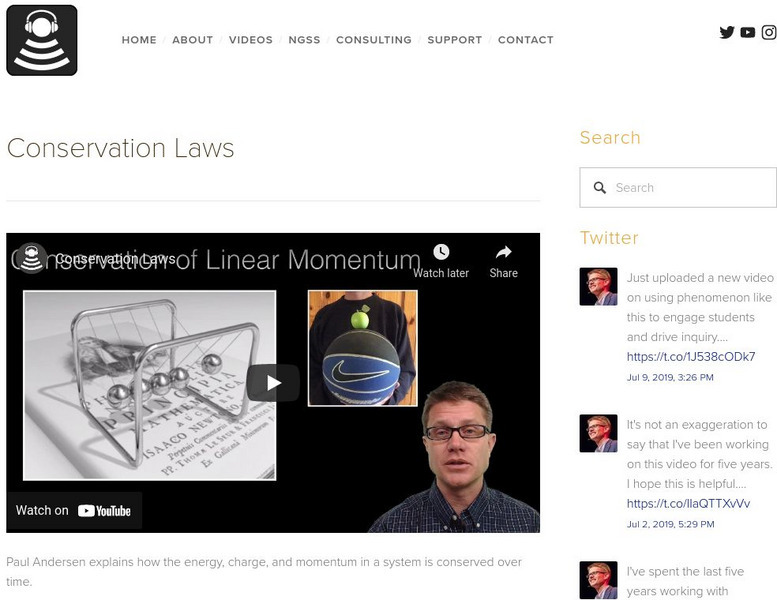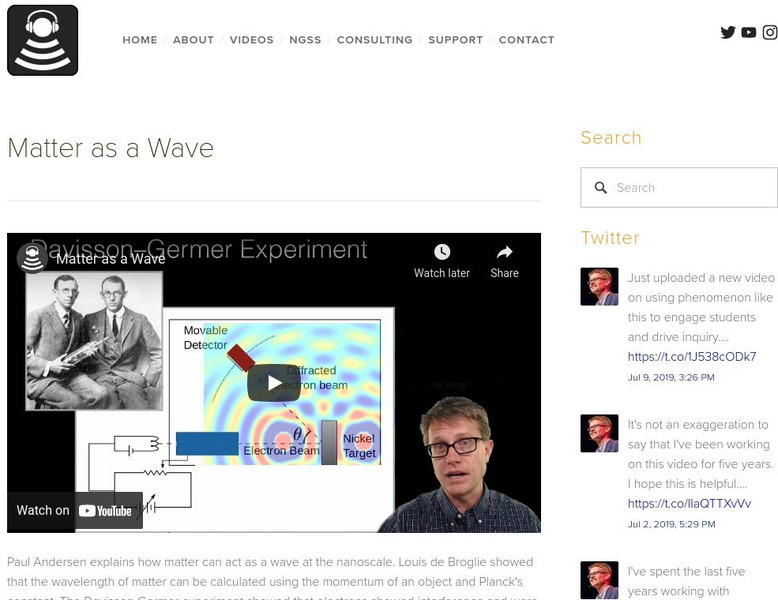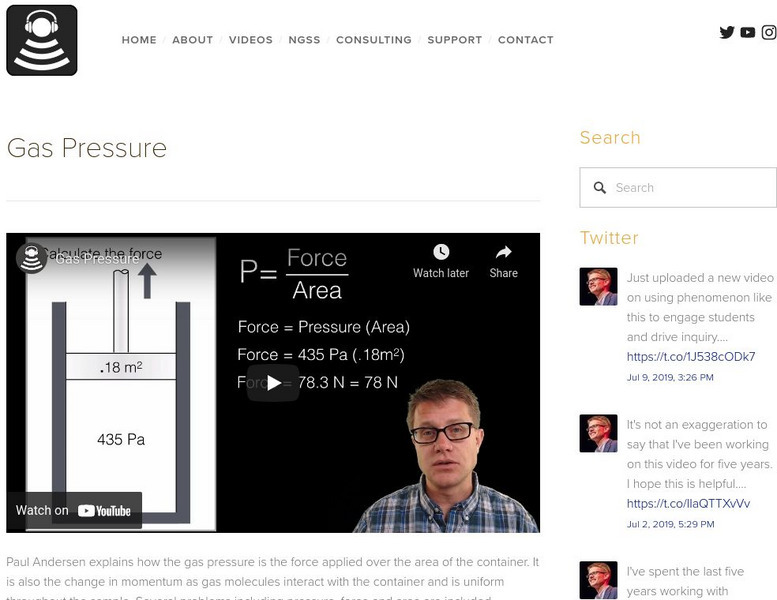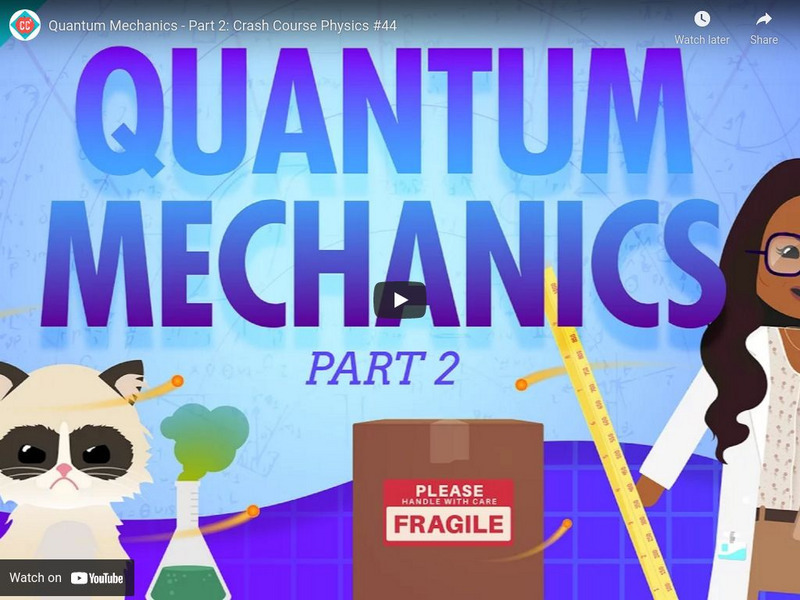Bozeman Science
Bozeman Science: Impulse
In the following video Paul Andersen defines impulse as the product of the force applied and the time over which the force is applied. The impulse of an object is equivalent to the change in momentum of the object. [9:11]
Bozeman Science
Bozeman Science: Angular Momentum
Video [7:28] in which Paul Andersen explains in a clear and understandable way, that rotating objects have angular momentum.
Bozeman Science
Bozeman Science: Force Time Graph
In the following video Paul Andersen explains hot the force-time graph can be used to determine the impulse of an object. Since the impulse and the change in momentum are equivalent the graph can also be used to determine the change in...
Bozeman Science
Bozeman Science: Systems
The following video narrated by Paul Andersen explains how systems are two or more objects that interact with one another. If a system has no relevant internal structure it can be treated as an object. The conservation laws apply to...
Bozeman Science
Bozeman Science: Conservation Laws
The following video narrated by Paul Andersen explains how the energy, charge, and momentum in a system is conserved over time. [4:53]
Bozeman Science
Bozeman Science: Matter as a Wave
In the following video Paul Andersen explains how matter can act as a wave at the nanoscale. Louis de Broglie showed that the wavelength of matter can be calculated using the momentum of an object and Planck's constant. The...
Bozeman Science
Bozeman Science: Gas Pressure
In the following video Paul Andersen explains how the gas pressure is the force applied over the area of the container. It is also the change in momentum as gas molecules interact with the container and is uniform throughout the sample....
National Science Foundation
National Science Foundation: Science of Speed: Momentum and Time
Increasing the time of a collision from a tenth of a second to two tenths of a second can make a huge difference in the number of G's a driver experiences. The car, the track, seat belts, and seat construction spread out the force of...
Other
Physics Girl: Stacked Ball Drop
Momentum transfer is demonstrated by dropping a perfectly balanced stack of balls. How is the result like a supernova? [3:33]
Crash Course
Crash Course Physics #44: Quantum Mechanics Part 2
e=mc2. It's a big deal, right? But why? And what about this grumpy cat in a box and probability? In this video episode of Crash Course Physics, Shini attempts to explain a little more on the topic of Quantum Mechanics. [9:07]
Khan Academy
Khan Academy: Chemistry: Proof: U=(3/2)pv or U=(3/2)n Rt
A video lecture that relates pressure, volume, and temperature to internal energy. The lecture shows how to derive an equation for the ideal gas to relate internal energy and pressure and volume. The video shows that if the temperautre...
Khan Academy
Khan Academy: Momentum: Introduction to Momentum
Explains what momentum is, and works through a simple problem involving momentum. [9:18]
Sophia Learning
Sophia: Decreasing Momentum
A video module showing that to determine a decrease in momentum you should look at impulse. Videos explores the equation for impulse and its application. Also given in lesson is an example of how to decrease momentum. [4:59]
Sophia Learning
Sophia: Introduction to Impulse
A screencast which provides an explanation of impulse force as it relates to Newton's laws of motion. [4:12]
Sophia Learning
Sophia: Mass, Velocity, and Momentum
A narrated presentation which illustrates how momentum is affected by mass and velocity. [3:16]
The Kid Should See This
Tksst: Physics Girl: The Stacked Ball Drop (And Supernovas)
What happens when you drop a stack of bouncy balls together? Watch this classic momentum transfer demonstration, and discover how it relates to a supernova. [3:33]
Crash Course
Crash Course Physics #10: Collisions
COLLISIONS! A big part of physics is understanding collisions and how they're not all the same. Mass, momentum, and many other things dictate how collisions can be unique. In this video episode of Crash Course Physics, Shini sits down to...
Khan Academy
Khan Academy: Momentum: Ice Skater Throws a Ball
A simple conservation of momentum problem involving an ice skater and a ball. [6:01]
Khan Academy
Khan Academy: Momentum: 2 Dimensional Momentum Problem
An example of conservation of momentum in two dimensions.
Khan Academy
Khan Academy: Momentum: 2 Dimensional Momentum Problem (Part 2)
In this lesson we finish the 2-dimensional momentum problem. [9:33]
National Science Foundation
National Science Foundation: Science of Nfl Football: Newton's Third Law of Motion
NBC's Lester Holt breaks down Isaac Newton's Third Law of Motion and how energy transfers between football players who collide during a game. Professors Tony Schmitz of the University of Florida and Jim Gates of the University of...
Khan Academy
Khan Academy: Ap Physics 1 Review of Momentum and Impulse
Review momentum and impulse topics in the video. [13:20]
Khan Academy
Khan Academy: 2 Dimensional Momentum Problem
A video showing an example of a conservation of momentum in two dimensions problem that is worked out step-by-step. [10:36]
Khan Academy
Khan Academy: Momentum: Ice Skater Throws a Ball
Learn how to solve a conservation of momentum problem in this video. This simple conservation of momentum problem involving an ice skater and a ball. [6:00]























